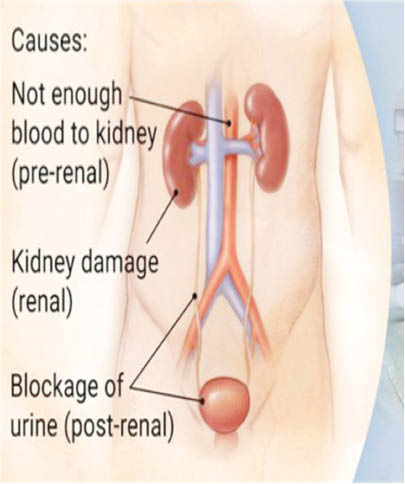Acute kidney injury – We are all at risk when hospitalised
What is acute kidney injury? Kidney failure is classified into two categories – acute and chronic. Acute kidney injury (AKI) has an abrupt onset, typically within a few hours or days and is potentially reversible. AKI is common in hospitalised patients especially among those in the intensive care unit (ICU) or following a surgical procedure. […]

What is acute kidney injury?
Kidney failure is classified into two categories – acute and chronic. Acute kidney injury (AKI) has an abrupt onset, typically within a few hours or days and is potentially reversible.
AKI is common in hospitalised patients especially among those in the intensive care unit (ICU) or following a surgical procedure. AKI causes a build-up of waste products in your blood, making it hard for your kidneys to keep the right balance of fluid and electrolytes.
What causes AKI?
The most common cause is dehydration and severe infection combined with toxic drugs, especially following surgery. It is important to quickly establish the cause of AKI, because in many cases, AKI is reversible if the underlying cause is quickly identified and remedied.
The causes of AKI are classified by the portion of the kidney anatomy that is most affected. AKI can be caused by decreased blood flow to the kidneys (pre-renal), direct damage to the kidneys (renal) or blockage of urine flow (post-renal).
Sometimes, however, diseases often cross these boundaries and do not fit nicely into a single category. For example, prolonged decreased blood flow to the kidneys or prolonged blockage of urine flow eventually causes direct damage to the kidneys.
In AKI as in chronic kidney disease, both kidneys need to be affected as one kidney is still more than adequate for normal kidney function. AKI can be caused by:
- a) Decreased blood flow to kidneys (Pre-renal) – due to excessive bleeding, dehydration, low blood pressure or heart failure.
- b) Direct damage to kidneys (Renal) – caused by severe infection, some medications, eclampsia, malaria or herbal concoctions.
- c) Blockage of urine flow (Post-renal) – due to enlarged prostate, kidney stones, prostate, or bladder cancer.
AKI – What some doctors will not tell you
A brief story – During my nephrology fellowship training in the late 80s, I spent an inordinate amount of time dialyzing patients who developed severe AKI while recovering from major surgery in the cardiothoracic or surgical ICU.
The patients’ hospital course was eerily similar – a frail 78-year-old woman is admitted for hip fracture and her serum creatinine level before surgery was 70 mmol/L (within the “normal range” which is 53 – 97 mmol/L).
After surgical repair of her hip fracture, she develops a fever. An infection is suspected, and she gets an antibiotic – Gentamicin 80mg given intravenously thrice daily. In 48 hours, she develops AKI and by the 4th day post-surgery her kidney failure worsens, necessitating dialysis. Did her doctors disclose the actual sequence of events to the patient or her family?
In the late 80s, estimated glomerular filtration rate (eGFR) was not being used to measure kidney function – clearly the patient received an inappropriately high dose of Gentamicin because of the assumption that she had “normal kidney function”.
What tests are done to diagnose AKI?
Diagnosis of AKI is made when there is a rapid reduction in kidney function and/or a rapid reduction in urine output. Additional testing to determine the underlying cause may include urine tests, blood tests, kidney ultrasound (detects blockage of urine flow) or kidney biopsy. The cause of AKI must be found promptly because it can lead to irreversible kidney failure or death.
What are the symptoms of AKI?
Many patients have no symptoms. Symptoms of AKI may include decreased urine output, bloody urine, body swelling, headache, tiredness, shortness of breath, confusion, vomiting or seizures.
What is the treatment for AKI?
The main goal is to treat the underlying cause. Treatments vary depending on the underlying cause and may include administration of intravenous fluids, discontinuation or avoidance of drugs that are toxic to the kidneys (called nephrotoxins) such as Ibuprofen and Gentamicin.
If low blood pressure persists despite adequate amounts of intravenous fluids, medications that increase blood pressure and/or medications that improve the heart’s ability to pump may be given to improve blood flow to the kidneys.
When there is blockage of urine flow, a urinary catheter is inserted. Lack of improvement with these interventions and worsening AKI will necessitate some form of dialysis.
What are the consequences of AKI?
As is the case worldwide, mortality in patients with AKI in Nigeria is very high, ranging from 20 to 40%. Each year, around two million people die of AKI worldwide. Among the patients who survive, about 5–10% will never regain full kidney function, thus requiring lifelong dialysis or a kidney transplant.
Patients with AKI are more likely to die prematurely after being discharged from hospital, even if their kidney function has recovered. Also, after having AKI, there is an increased risk for other health problems such as chronic kidney disease, stroke, heart disease or having AKI again in the future.
How do we prevent AKI?
Hospitals must devise and implement measures to prevent AKI or to promptly recognize it and treat it quickly. Details on prevention of AKI will be discussed in a future article.
